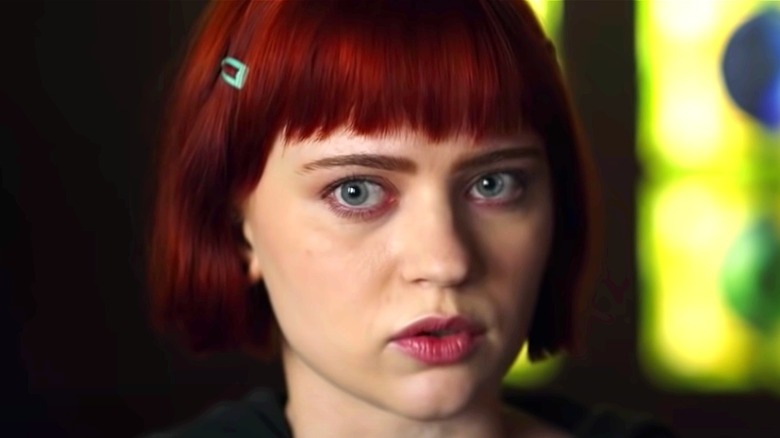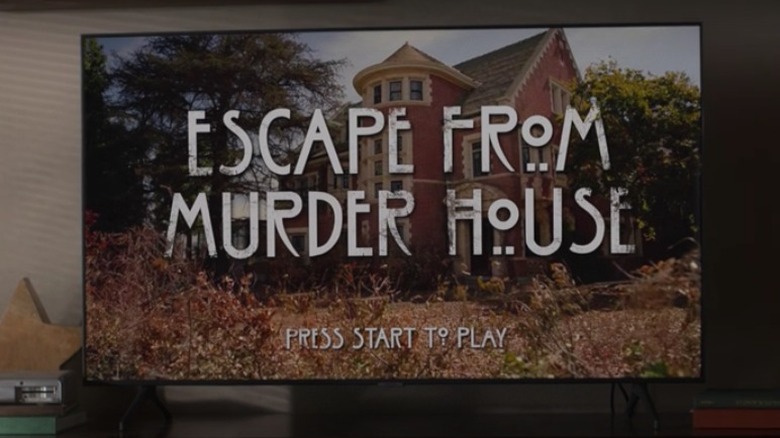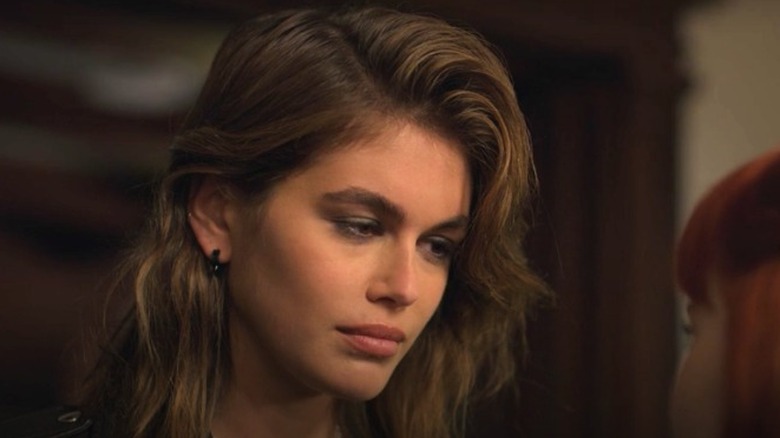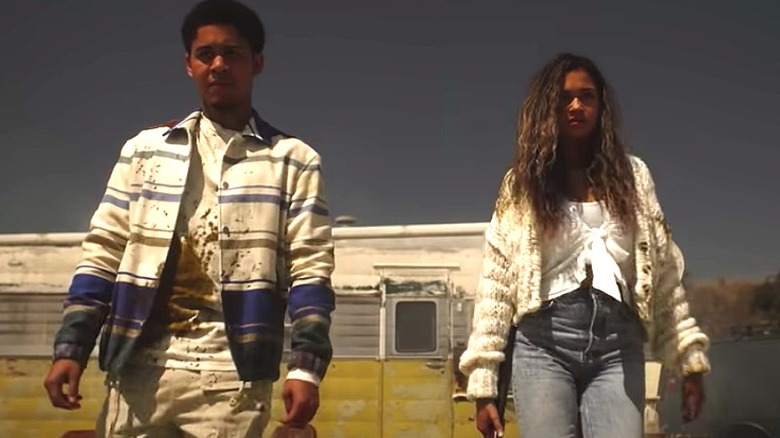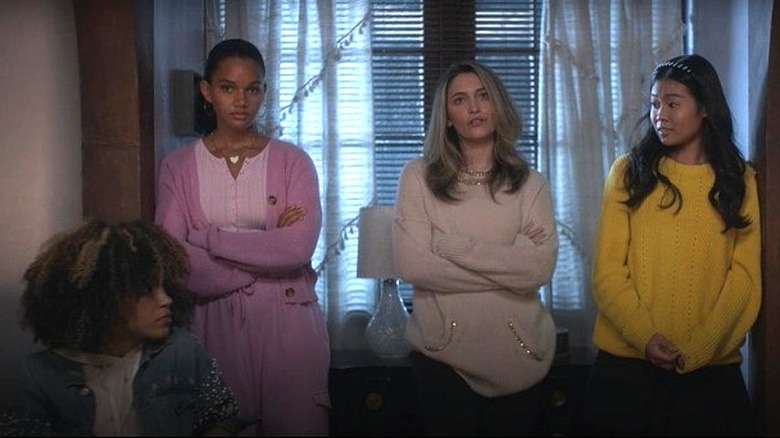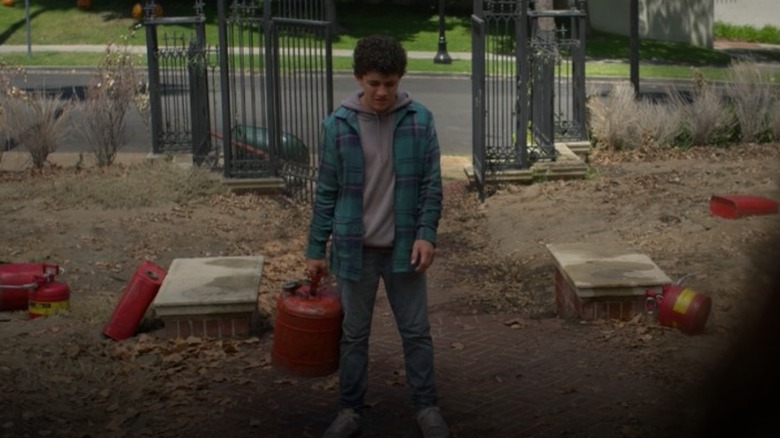Everything American Horror Stories Season 1 Did Wrong According To Fans
In June of 2021 — prior to the fall release of "American Horror Story: Double Feature" — creators Ryan Murphy and Brad Falchuk released "American Horror Stories," a series of seven semi-self contained horror shorts that pretty immediately (and perhaps intentionally) left long-time "AHS" fans divided. While many saw the (possibly?) non-canonical storylines and the emphasis they placed on camp (and fan base call-outs) as a lighthearted and refreshing spin on its parent series, a large percentage of viewers were left bored, disappointed, annoyed, and utterly confused.
Of the seven episodes, "BA'AL," "Feral," "The Naughty List," and "Drive-In" were truly stand-alone stories, while "Rubber Woman" parts 1 and 2 and "Game Over" were not only interconnected, but connected to the greater "American Horror Story" universe via their Murder House setting. Unsurprisingly, the self-contained storylines ruffled fewer feathers, and a couple even managed to garner some praise, but much of what disappointed "AHS" audiences had less to do with the series drifting in and out of the known "AHS" universe, and more to do with ... well, just about everything else.
Fans felt American Horror Stories placed trolling and jokes over substance
While "American Horror Stories" wasn't without its high points, many viewers were convinced the show's writers were trolling them, particularly in the final episode, "Game Over."
"I've seen people saying this is Ryan (Murphy) and Brad (Falchuk) mocking us," wrote u/man_with_no_nation on the series' subreddit, asking others "What is the point?" While at least one commenter appreciated the season finale "BECAUSE it was a full on troll of the fandom," many were bored and confused. As you may or may not recall, "Game Over" was the most meta episode of the series, and centered around a mom hellbent on making a videogame for her "AHS"-loving teen, so that he'd ... like her? Something like that.
This isn't the first time audiences felt mocked by the horror series' writers – and the horror genre, as a whole, always relies on a proactively antagonistic push-and-pull with viewers — but without a truly fascinating point to make outside of "fans can be toxic," this approach loses its mojo. "I was so excited for this spin-off series," wrote one fan, "but wow. After week 3 it just became a chore to sit through." Others had a different theory as to the writers' motivations, though not one that made them enjoy the series any more. As u/thang_pq wrote, "they deliberately make it as bad as possible just to elevate AHS10." This theory was built-on by another fan, who "assumed it was (to) elevate every season past and future," because "Now anytime someone's like 'cult was the worst season', you can point to this as a 'was it though?.'" It's an interesting theory (one Digital Spy has also proposed), but would its verity be enough to redeem the series in the eyes of fans?
Many fans were disappointed with the casting in American Horror Stories
That redemption seems unlikely, considering audiences were equally turned-off by what they perceived as unintentionally bad acting. "The acting is just so terrible. It's so so terrible," wrote a fan on the series' subreddit, a feeling that was shared by more than a few others. "The acting is just...yikes," added u/j4321g4321, "And the fact that there were two Fuller House actors in this was even more lol." Several viewers attributed this to the series casting actors based on their pedigree, as opposed to their experience or abilities. "I'd like to see some actors who don't come from famous parents," wrote one fan, while another referred to cast members like Paris Jackson, Kaia Gerber, and Noah Cyrus as "nepo babies" ('nepo' as in nepotism), and agreed they were "terrible" in the show.
"The acting was really off," said a fan in a separate Reddit thread, who thought (veteran "AHS" actor) "Matt Bomer was the only one doing a good job." In an attempt to get to the bottom of all this dislike for the series' new cast members, u/ClearFishTankOrbs recently asked others why they had a problem with certain famous offspring (Gerber in particular) and not others, since Emma Roberts, Billie Lourd, and Taissa Farmiga all also come from Hollywood families. "I'm good with Nepotism as long as they can act," wrote u/livtoben, while another fan pointed out that Roberts, Lourd, and Farmiga come from acting families, while Jackson and Gerber were, they felt, "just familiar faces who brought nothing to their lines" (via Reddit).
On the other hand, many felt it was those lines, and not the actors delivering them, that were the real problem.
Fans thought the writing was lazy and unintentionally cliche
At least a few fans blamed the writing itself — and not the fledgling actors and their performances — for their disappointment in the series. "I actually thought Noah (Cyrus) played her part well," wrote u/Magcargo64 on the series' subreddit of the actor's role in "Game Over," "it's just that the part was written awfully." Another viewer agreed, saying (of Cyrus) that "she wasn't bad, the writing was what ruined her character" (via Reddit). Reddit user Bellomontee felt that "Rubber Woman's" Ruby and Scarlett were "two of the worst AHS characters ever," and were hoping they were "from the video game reality" (in the series' finale) which might explain their lack of depth and believability. "There's hardly any context behind the new characters," added jdkbdh1, who accepted that might be the result of the series being "rushed," but nonetheless felt viewers "deserved better."
While it's true the series didn't have much time or space in which to develop its new characters, many still felt it was the writers' inability to produce believable or realistic teen dialogue that killed the show for them. "If you can't write a remotely believable teenager," wrote u/SomeProphetOfDoom, "it isn't a good idea to make all of your stories revolve around teens." One fan called those stories "incredibly cliche," while another joked that they were "written at the level of high school fan fic" (via Reddit).
Speaking of high school, many fans were disappointed in "American Horror Stories" repeated focus on much younger characters and their various (and, in their eyes, inaccurate) trials and tribulations.
Fans were unimpressed by American Horror Stories taking such a Gen-Z focus
With the exception of the more championed "BA'AL" and "Feral," much of character and storyline focus in "American Horror Stories" centered on either actual high schoolers, or on millennial influencers attempting to appeal to high schoolers. While "American Horror Story" has touched on younger plot lines and characters before (most prominently in "1984," as well as "Coven," and parts of "Death Valley") they've rarely been the focal point of a given season's theme or commentary. All this changed with "American Horror Stories," and many fans were less than thrilled, not only with the demographic redirect, but with the way that demographic was portrayed.
As Reddit user Rootofcreations noted, "TEENS TEENS TEENS TEENS. Episode 1, 2 ,3 and the Christmas episode 4 all (center) around teenagers. Do you think Murphy is trying to appeal to a younger audience while scouting for young talent?"
Several users on the thread echoed the poster's theory, with one pointing out that "AHS has a lot of teen viewers," and another noting that it "kind of blew up on tik tok" (via Reddit). That said, many felt that the series' depiction of (and commentary on) today's teens felt lacking at best, and offensive and inaccurate at worst. "As a teen viewer," wrote u/meIodramatiic, "...I speak for a good majority of the younger AHS audience when I say their approach is completely cringeworthy, unnecessary, and inaccurate." Another fan called the series' Gen-Zers "extremely unbelievable...bizarrely (over-sexualized), completely apathetic and 100% aloof." This baffled other users on the thread, who couldn't understand the show's reasons for the Gen-Z focus, particularly considering most fans felt their depiction was (among other things) "corny woke," "out of touch," and "written by a depressed 13 yr old" (via Reddit). Why, they wondered, would the writers attempt to appeal to a younger demographic by using that demographic as a comedic vehicle for snarky commentary? After all, a vegan restaurant that mocks or misrepresents vegans — but carries only vegan offerings — appeals to neither vegans nor omnivores.
AHS fans were upset by the inconsistencies in Stories
"American Horror Story," as a series, is no stranger to fans nitpicking various plot holes or inconsistencies in arcs set-up by past seasons and altered in connecting later seasons. But with "American Horror Stories" — particularly in the series finale, "Game Over" — fans felt the writers finally jumped the shark with regard to rewriting the rules as a matter of convenience rather than intent.
"The inconsistencies annoyed me so much," wrote salty_sparrow on the AHS subreddit, referring to the series' inconsistent approach to "freeing" ghosts from The Murder House, while many were wondering why — if all one had to do was burn it down — no one had ever thought about that before. We know ghosts can leave the property on Halloween, so why can't they cause a fire?
"I feel like they left too many holes with the Murder House episodes," wrote one fan, while another had a series of questions for the writers, including "where are the other ghosts? Do they just chill out of sight when they want to be bothered?...And Ruby has a cell phone? How do they pay the bills? And why do Ruby and Scarlett only meet on Halloween? Can't Scarlett just come in and hang out whenever? And she doesn't care to see her dads? There's just way too much more to unpack..." (via Reddit).
Of course, if both Rubber Woman episodes exist solely within the video game reality, that gives all the rule breaking and plot hole digging some semblance of reasonable mechanics, but maybe not enough to convince most of the series' detractors: "They need to let that ******* house go," wrote SonnySunshineGirl.
